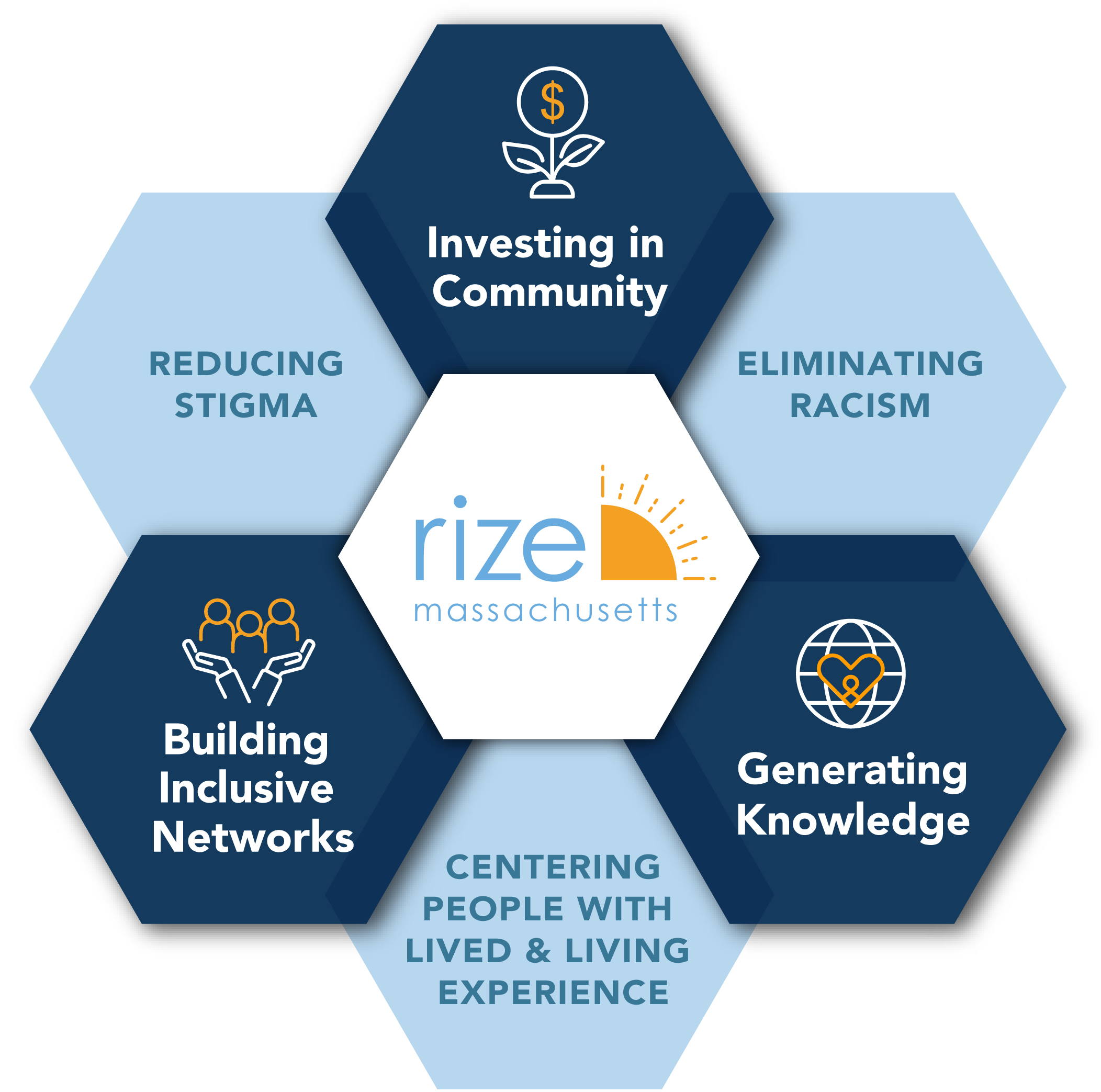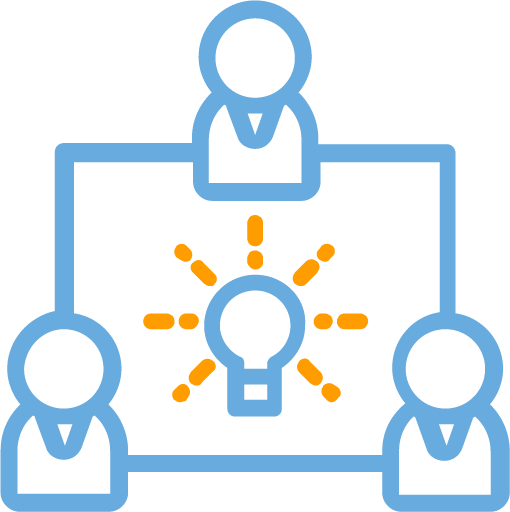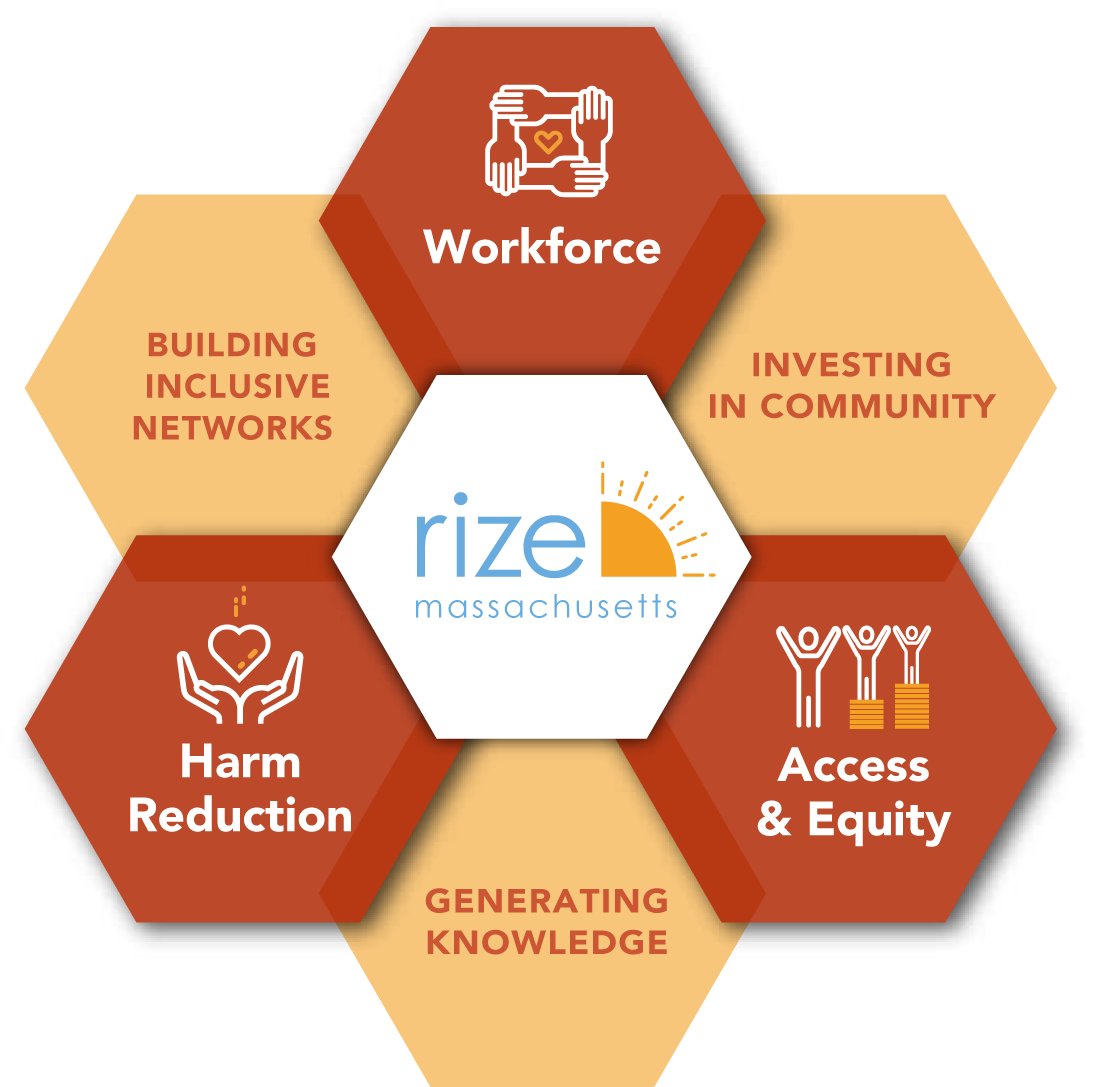Impact Areas
RIZE’s multifaceted strategy is designed to address the complexity and enormity of the crisis and will only be effective if it is based on the evolving realities on the ground. We listen to and learn from each other, monitor the success of our collaborations, and hold each other accountable toward a common vision of “zero stigma. zero deaths.” Our work is iterative, designed to both support and expand upon our areas of focus in a manner that maximizes impact.
We organize our work into three focus areas – investing in community, generating knowledge, and building inclusive networks. The interconnectedness of this work has also produced cross-cutting strategies that respond to all three focus areas.

Investing in Community
We support comprehensive, compassionate, and sustainable approaches across the care continuum. Learn more about our grant programs below.
Generating Knowledge
We fund and promote independent research and evaluations of programmatic or policy interventions to increase visibility, expand the evidence base, and inform policy. Review our publications here.

Building Inclusive Networks
We build stronger networks by bringing together a diversity of organizations and individuals dedicated to ending the overdose crisis. Stronger networks create space for finding common ground and creating unexpected and novel approaches. View our past and upcoming events here.
Current Programs
Our key grantmaking programs demonstrate how we are disrupting the status quo by selecting, supporting, and scaling the most effective and innovative programs available today and putting them to work saving lives.

All Programs:
Building the Field: Supporting Enhanced Training Opportunities for Recovery Coaches
Workforce
To support training opportunities that provide recovery coaches with concrete tools and strategies to become effective recovery coach supervisors and to improve their ability to support people with co-occurring disorders.
- Total Award: $152,493
- Grantees:
- 2024: Center for Health Impact, Eliot Community Human Services, Malden Overcoming Addiction, Montachusett Recovery Foundation Corp, North Suffolk Community Services, Sanofka Institute for Collective Wellbeing, Steppingstone, Inc.
- 2023: Center for Health Impact, Malden Overcoming Addiction, Inc., North Suffolk Community Services, The Western Massachusetts Training Consortium
- 2022: Choice Recovery Coaching, Torchlight Recovery
Comprehensive Place-based Response to the Opioid Crisis
Access & Equity, Workforce
To provide greater coordination and improved service delivery at the municipal level for those suffering with substance use disorder.
- Total Award: $310,500
- Grantees: Chelsea – Community Action Programs Inter-City, Everett Fire Department, Malden Public Health Department, Medford Health Department Office of Prevention and Outreach, Metropolitan Area Planning Council
Enabling Health: Enhancing Harm Reduction Services in Massachusetts
Access & Equity, Harm Reduction
To expand existing harm reduction services and build an infrastructure to offer clinical addiction services within non-clinical settings.
- Total Award: $1,808,555.25
- Grantees: AIDS Support Group of Cape Cod, Greater Lawrence Family Health Center, HRH413, Kraft Center for Community Health, Life Connection Center
Frontline Fund Grants Program
Access & Equity, Harm Reduction, Workforce
To provide flexible funding to organizations on the frontlines of the overdose crisis.
- Total Award: $223,221
- 2023 Grantees: Action for Boston Community Development, William J. Ostiguy High School (Boston), Behavioral Health Innovators, Inc. (Chatham), Boston Medical Center, Bridge Over Troubled Waters (Boston), Fathers’ Uplift (Boston), Jeff’s Place (Framingham), Hilltown Youth Recovery Program (Charlemont), Massachusetts Organization for Addiction Recovery (Boston), Out For Good (Boston), Ricky, Inc. (Norwood), To the Moon and Back (Plymouth), United Way of Plymouth County (Brockton), Worcester Addresses Childhood Trauma (Worcester)
HaRT Continuing Education Units
Harm Reduction, Workforce
To develop continuing education courses for social workers about the principles and practices of harm reduction.
- Total Award: $88,000
- Grantees: National Harm Reduction Coalition, National Association of Social Workers Massachusetts Chapter
HaRT Scholars Program
Harm Reduction, Workforce
A specialized internship program – the first of its kind in the country – developing a pipeline of social workers who are trained in harm reduction.
- Total Award: $1,709,629
- Grantees: Bridgewater State University, Boston College, Simmons University, Westfield State University
Identifying Opportunities to Innovate and Promote Best Practices in Opioid Use Disorder Treatment within Pharmacies
Harm Reduction, Workforce
To survey pharmacists to better understand current attitudes, knowledge and practices in serving people with OUD. Findings to inform innovative investments in pharmacies and pharmacists as a key intervention point in the OUD care continuum.
- Total Award: $175,000.00
- Grantee: Commonwealth Medicine University of Massachusetts Chan Medical School
Improving the Oral Health of People Seeking Substance Use Treatment
Access & Equity
To develop a new oral health intervention pilot program for people experiencing substance use disorder.
- Total Award: $215,566
- Grantee: UMass Chan Medical School
Innovations in Anti-Racism to Address the Opioid Crisis
Access & Equity
To improve access to addiction treatment by reducing the stigma and structural barriers faced by Black, Indigenous, and people of color.
- Total Award: $967,200
- Grantees: Boston Public Health Commission, Casa Esperanza, Codman Square Health Center, Prisoners’ Legal Services of Massachusetts
Insights and Solutions Research
Access & Equity, Harm Reduction, Workforce
To initiate research and data analysis to increase access to treatment for opioid use disorder and contribute to developing the evidence base.
- Total Award: $864,427
- Grantees:
- 2024 – Institute for Community Health
- 2023 – Brandeis University Opioid Policy Research Collaborative, Massachusetts Drug Supply Data Stream (MADDS)
- 2022 – Boston Medical Center Corporation, Brandeis University Opioid Policy Research Collaborative, Institute for Community Health
- 2019 – Boston Public Health Commission/Institute for Community Health, Brandeis University, Tufts University School of Dental Medicine
Linkages to Care (LinC)
Access & Equity, Harm Reduction, Workforce
The Linkages to Care (LinC) funding opportunity seeks to strengthen broad-based, multi-stakeholder networks and partnerships between community-based organizations (CBOs) and healthcare entities.
- Total Award: $1,995,354
- Grantees: AIDS Support Group of Cape Cod (Cape Cod), Community Health Connections (Fitchburg), Riverbend (Lowell), Metro Boston Alive (Boston), North Shore Community Health (Salem), Somerville Homeless Coalition (Somerville), The Pettengill House, Inc. (Amesbury), Wednesday Meeting DBA Whose Corner Is It Anyway (Holyoke)
Network One: New England Community Drug Checking Innovations Network
Harm Reduction
To expand support for Network One, a regional drug supply checking network that collects data to inform harm reduction services, coordinated by Brandeis University, the Department of Public Health and drug testing sites statewide.
- Total Award: $100,000
- Grantees: Brandeis University, Opioid Policy Research Collaborative, Massachusetts Drug Supply Data Stream (MADDS)
Saving Lives, Improving Health: Redesigning Opioid Use Disorder Care
Access & Equity
To expand the system of low threshold community-based, on-demand treatment and support long-term treatment to improve health and quality of life.
- Total Award: $2,796,816.00
- Grantees: Boston Health Care for the Homeless; Brockton Neighborhood Health Center; Lynn Community Health Center. Community HealthLink (Year-one only) Cambridge Health Alliance (Design only) Center for Human Development (Design only)
- Evaluator: Institute for Community Health
Taking Action to Improve Access and Equity in Opioid Use Disorder Care
Access & Equity
Together in Recovery
Access & Equity
To foster an accessible, integrated treatment and recovery network in Massachusetts that champions evidence-based approaches, supports multiple pathways to recovery, and puts people in charge of their treatment choices.
- Total Award: $320,322
- Vendor: C4 Innovations
Together We RIZE Grant Program
Access & Equity, Harm Reduction, Workforce
To support bold, community-driven projects and initiatives that have the potential to bend the curve of overdose crisis.
- Total Award: $598,225
- Grantees: Berkshire Harm Reduction, Grayken Center for Addiction at the Boston Medical Center, Brockton Neighborhood Health Center, North Suffolk Mental Health Association, St. Francis House, South Shore Health
Understanding & Bolstering the Harm Reduction Workforce in Massachusetts
Harm Reduction, Workforce
To identify, quantify, and understand the harm reduction workforce and build capacity, support practitioners/harm reductionists in their current roles, and provide educational opportunities for growth.
- Total Award: $70,000.00
- Grantee: Brandeis University Heller School for Social Policy and Management
Understanding Linkages Between Community-based Organizations and Community Health Centers for Substance Use Disorder Care
Access & Equity
To study and improve community-based referral networks for substance use disorder care.
- Total Award: $60,050
- Grantee: Institute for Health Equity Research, Evaluation and Policy of the Massachusetts League of Community Health Centers